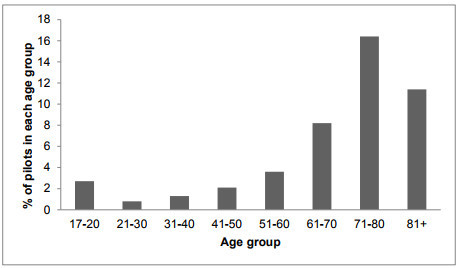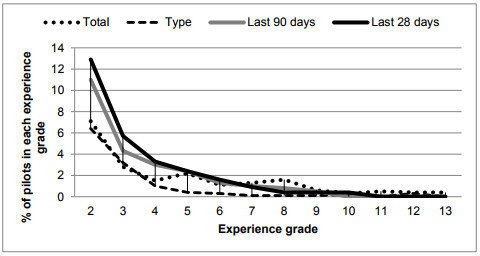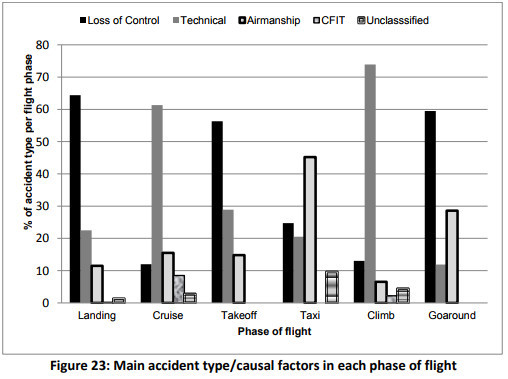This research paper ( local copy ) has just popped up on the UK scene. I am sure the paper is applicable to GA everywhere in Europe because the training system is basically the same and the currency constraints (time, money, family pressures) are the same everywhere.
It is a big paper, but really interesting.
Due to apathy in the pilot population, the researcher had a lot of difficulty collecting the data and managed a sample of only a few % – a bit worrying.
Page 45 has some data on the pilot age distribution.

Page 71 onwards is accident causes. Nothing surprising there.
Page 84 suggests that most accidents happen to “older” pilots:

but experience makes a big difference to risk, with more experience greatly reducing the risk

Page 89 explains that the older pilots are likely to have a very low currency.
This graph of accident causes (page 157) is interesting, though probably not unexpected. Still, the high % of loss of control during landing and takeoff looks pretty bad

Page 211 onwards suggests what could be done to improve things. There are some very good points there, much discussed here previously e.g. school/club requirements on currency which meet with vigorous opposition from some.
Page 223 pretty well sums it up:
Peter wrote:
This research paper ( local copy ) has just popped up on the UK scene.
Very interesting. It appears worth reading in full.
Haven’t read the paper yet, but I’m wondering if the low response rate is linked to how pilot recruitment was attempted (schools vs online forums for example)?
See page 43/44. He tried a few methods. That he got a poor response from “clubs” doesn’t surprise me.
One of the biggest issues are pilots who do not believe that further training will assist them. Plenty talk to you about it. Ah, your an instructor, we must fly sometime. I could do with xxxxx. Generally you never hear from them again. A lot in the community having got their licence, think that is it, especially in the transition from PPL to NPPl. It is also amazing the number of pilots, particularly in the club scene, who fly the minimum hours each year. An hour a month in a clapped out PA28, with a 430 that they cannot even use correctly. A lot get through life by the skin of their teeth and ’there by the Grace of God etc..
BeechBaby wrote:
who fly the minimum hours each year
Overheard recently from an expired PPL talking to an instructor …. ‘I have to do a charity flight that was sold at my daughters school, so I need to revalidate my licence’.
Yes you’re right, he says he got the most answers from one of the forums. It does make you wonder how people stay informed about the evolution of regulations, tech and other things (like listening squawks) if they aren’t reachable via clubs or forums.
On your point Beechbaby, I suppose that’s true; it’s also true that the lack of freelance instructors in the UK and the prevalence of ATOs with their focus on ATPL means pilots who want to get trained (recurring or get an IR or a TRI) can find it difficult. It’s a very different situation in the US.
BeechBaby wrote:
It is also amazing the number of pilots, particularly in the club scene, who fly the minimum hours each year.
quatrelle wrote:
Overheard recently from an expired PPL talking to an instructor …. ‘I have to do a charity flight that was sold at my daughters school, so I need to revalidate my licence’.
That is something which has been bothering me for a while now. I am not a club pilot (at the moment at least) but in the last 2 years my flying was basically zero, to the point where about 6 hours ago my SEP lapsed. It is not amazing to me that this happens to so many private pilots, I can see it happen all the time. People have way too much obligations these days and all of them are more important than flying. So there comes a point where one has to set priorities and maybe admit that flying is not for them in this particular phase of life.
In Switzerland we had a series of appalling accidents this year (even though one was not by a swiss airplane) and all of them hit home. We had two PA28’s go in in the alps, one of which I knew all on board after a fashion, they were participants of a youth camp for aviation. The pilot was based in the mountains, had plenty of experience yet he killed himself and two 14 year old boys and injured a girl of 17, all 3 of which had attended a met lecture with me less than 8 hours before. We lost a Malibu with a very well known and proficient pilot and his partner, who both had flown much more demanding flights before including the NATL and other long range travel, great guy with plenty of experience. And we lost a Mooney 231 with two on board who flew VFR when the Alps were X-Rayed out.
As a father of a year old daughter I have to ask myself serious questions here and it is not yet clear if I will continue flying after all that has happened combined with the fact that time has become a very precious commodity. Personally I think the 12 hours a year currency is not anywhere close enough to operate safely, someone who does not fly more than once a week has to question whether not to be honest with themselfs and find a hobby which is not so demanding. I tend to believe that 100 hrs p.a plus regular proficiency checks would be a more adequate minimum requirement, but then of course this would ground 90% of all PPLs immediately.
It hurts loosing the rating but maybe it is for the best. We’ll see what the future for the plane will be.
It does make you wonder how people stay informed about the evolution of regulations, tech and other things (like listening squawks) if they aren’t reachable via clubs or forums.
My view, from “hanging around the place” for 17 years, is that the vast majority of pilots who actually go anywhere are entirely outside the training system. And for good reason – the schools/clubs are not generally welcoming to experienced pilots. I suspect the experienced pilots – expecially if they own a plane – are seen as taking money away from the school which might be selling some rental + instructor time. When I did that VFR-Europe presentation, the local schools refused to distribute any leaflets about it inside the school. Like the famous “aeroclub president” institution, they clearly know what is best for their customers  And I can’t believe this is a UK only phenomenon. I hear the same stories of school/club politics from elsewhere. This doesn’t matter much if you fly a lot and are reasonably diligent.
And I can’t believe this is a UK only phenomenon. I hear the same stories of school/club politics from elsewhere. This doesn’t matter much if you fly a lot and are reasonably diligent.
Then you get a large group of very low time pilots who are “in the system” in the sense that they rent from a school/club but for various reasons they fly very little.
The first problem to tackle is that the 2-yearly revalidation flight is assured to be signed off provided the instructor survives the flight… but nobody will have a go at changing this because there would be widespread opposition to it becoming a “test”.
But there is another issue: one needs to bring pilots up to date with e.g. how to get weather and notams via the internet. The community which has been flying for a long time is rather stagnant and is not picking up new developments. I don’t know if the study shows this but I bet that this community has a lot higher age distribution than the entire community of pilots with a valid license+medical, and there is an obvious correlation between higher age and inability to use the internet. There is an astonishing level of inability to “get weather”.
I reckon this researcher was unable to get the CAA to contact the pilots. That way he would have at least been able to send out some 20k questionnaires.
We lost a Malibu with a very well known and proficient pilot and his partner, who both had flown much more demanding flights before including the NATL and other long range travel, great guy with plenty of experience. And we lost a Mooney 231 with two on board who flew VFR when the Alps were X-Rayed out.
Those accidents have always been happening. I don’t think anybody had really worked out why people do it. Sometimes one can find out interesting stuff from people who knew the pilot personally… it usually turns out the pilot was a bit of cowboy who managed to get away with all kinds of stuff for many years – until he didn’t. I can think of two I knew about which fitted that description: N2195B and N403HP. That kind of info will not end up in accident reports and this report pretty wall says that straight out.
Interesting link thanks, I will have to sit and read fully! I think the majority of accidents boil down to:
(1) Poor decision making
(2) Poor handling
You can do a lot about (1) via education, reading, forums etc without spending money and time airborne but the critical factor in (2) is currency.
In one of my roles flying air cadets we have to do the following at least every 90 days:
Four turn spin
Incipient spin
Practice forced landing off airfield
Stalling x 3 configurations
EFATO
Circuits of all types
And have a mandatory 6 monthly flying standards exam.
I know that’s an extreme compared to what may be required for an average PPL, but it amazes me that people will happily go years without practicing a stall or forced landing until their biennial check